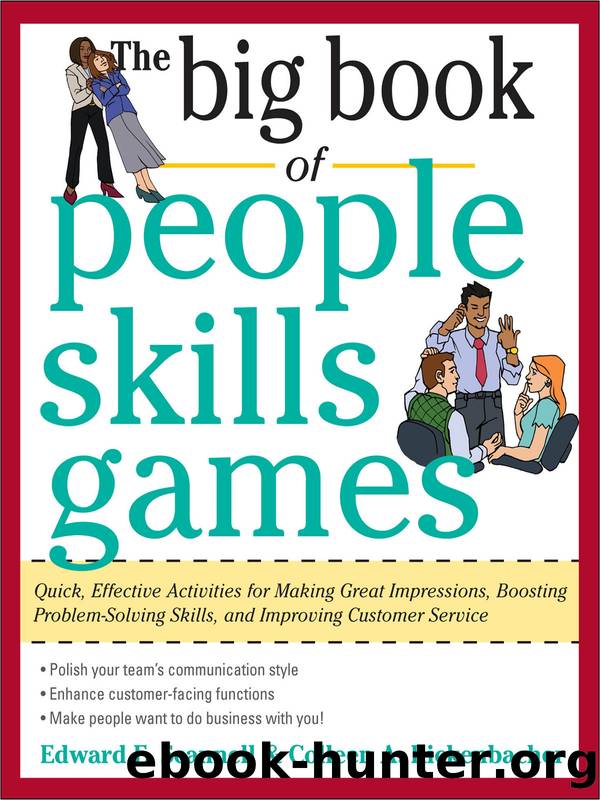The Big Book of People Skills Games by Edward E. Scannell & Colleen A. Rickenbacher

Author:Edward E. Scannell & Colleen A. Rickenbacher
Language: eng
Format: epub
Publisher: McGraw Hill LLC
Published: 2010-01-15T00:00:00+00:00
E-mails might be the most used and the most common social faux pas. We send them quickly and in return expect a quick response. We now abbreviate and use shortened variations of words, and also feel that at any time or place it is appropriate to be checking e-mails, texting, and playing games. What happened to our etiquette, our kindness to the people around us, and the civility of being nice and respectful? We have allowed our multitasking environment to take us over.
Leading up to the 1990s, we always had a format for proper letter writing or the standard for our particular office or company. But, along came business-casual dress and the business-casual letter writer.
Guidelines to follow for a more professional e-mail:
⢠E-mail is still a business communication. Watch grammar, spelling, and abbreviations. People will judge your e-mail just as critically as they judge a business letter.
⢠Use the subject line. It may get your message read a little faster and the reader will be able to find the message for future referral. This could be the most important part of your e-mail and message.
⢠Donât use e-mail when a handwritten note is more appropriate.
⢠If you get a request addressed to numerous people, respond only to the sender unless requested to do otherwise.
⢠Read all your e-mails before responding. Go to the most recent ones first and you may discover earlier messages have been amended or updated.
⢠Be discreet about sending jokes and other questionable comments. You never know who may receive or pass on something you thought would remain private.
⢠Respond to e-mails or ask to be removed from unwanted routing lists.
⢠Some companies can and will monitor employee e-mail. Legally, employers have the right to read all employee e-mail on their computer systems. Thirty-two percent of large U.S. companies pay people to read employee e-mails. According to Proofpoint Inc., 28 percent of large U.S. companies have terminated employees for e-mail policy violations.
⢠Donât let e-mail (or any other written form of communication) substitute for discussing important issues in person.
⢠If e-mailing internationally, keep the language as formal as possible. Casual language, clichés, jargon, and slang words or phrases may have different meanings elsewhere.
⢠Make sure you have a signature line at the end of your e-mail message. Quick reference to your full name, title, company, address, phone, fax, e-mail, and Web site will make it easy for people to contact you.
⢠If you are out of your office for an extended time, use the âOut of Officeâ tool so people sending you e-mails will know that you are not available to answer immediately. You can also provide information about your return, other ways to contact you if necessary, and any other details, but keep your message short and concise.
Technology has been driving us to reach new goals that are faster, more efficient, and instantaneous. But, with this technology, very few rules of business etiquette have come along with our training. We are taught how to beat the
Download
This site does not store any files on its server. We only index and link to content provided by other sites. Please contact the content providers to delete copyright contents if any and email us, we'll remove relevant links or contents immediately.
Life 3.0: Being Human in the Age of Artificial Intelligence by Tegmark Max(5558)
The Sports Rules Book by Human Kinetics(4388)
The Age of Surveillance Capitalism by Shoshana Zuboff(4293)
ACT Math For Dummies by Zegarelli Mark(4049)
Unlabel: Selling You Without Selling Out by Marc Ecko(3663)
Blood, Sweat, and Pixels by Jason Schreier(3624)
Hidden Persuasion: 33 psychological influence techniques in advertising by Marc Andrews & Matthijs van Leeuwen & Rick van Baaren(3565)
The Pixar Touch by David A. Price(3439)
Bad Pharma by Ben Goldacre(3428)
Urban Outlaw by Magnus Walker(3396)
Project Animal Farm: An Accidental Journey into the Secret World of Farming and the Truth About Our Food by Sonia Faruqi(3221)
Kitchen confidential by Anthony Bourdain(3090)
Brotopia by Emily Chang(3056)
Slugfest by Reed Tucker(3004)
The Content Trap by Bharat Anand(2927)
The Airbnb Story by Leigh Gallagher(2857)
Coffee for One by KJ Fallon(2636)
Smuggler's Cove: Exotic Cocktails, Rum, and the Cult of Tiki by Martin Cate & Rebecca Cate(2541)
Beer is proof God loves us by Charles W. Bamforth(2462)
